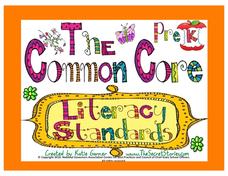Curated OER
In Legal Limbo
Newspapers are great learning tools. They act as a conduit for current events, reading comprehension, and critical thinking. Here, pupils read a New York Times article regarding US immigration law under the Obama administration and...
Curated OER
The New YouTube
Can you guess how many hits YouTube gets in one day? If you said two billion, you're wrong. If you said three billion, you're getting closer, but you're still over a billion hits away! Use this article to bring current events into the...
Curated OER
Nathaniel Hawthorne's—The Scarlet Letter
Designed for teachers, this guide to The Scarlet Letter is divided into background information about Hawthorne and Puritan New England, suggestions for teaching various ability levels, and ideas for extensions that include...
C-SPAN
Student Symposium and Resulting Action
Your class may not be able to vote yet, but that doesn't mean they can't feel like they're part of the presidential election! The resource creates a symposium where pupils debate about a selected topic in current events during an...
News Literacy Project
News Goggles: Lionel Ramos, Oklahoma Watch
Given all the recent criticism of the news media and coverage, it's crucial that young people are given the tools they need to evaluate what they see, hear, and read about current events. A video interview from "News Goggles" introduces...
Curated OER
Afghanistan: Country Report with Questions
Building fluency in reading informational text is part of the common core. Get learners reading information about past and current issues related to the country of Afghanistan. They read the seven paragraph passage, then answer four...
Curated OER
Living News: Classroom Materials
Students explore controversial current events. For this Bill of Rights lesson, students research selected issues and examine the issues from different perspectives. Students script and record news stories that feature their findings.
Curated OER
Cartoons for the Classroom: College as Concept
In this current events worksheet, students analyze a political cartoon about the college application process and respond to 3 talking point questions.
Curated OER
Cartoons for the Classroom: Why is Freedom of Speech a Burning Issue?
For this current events worksheet, students analyze a political cartoon about the freedom of speech and respond to three short answer questions
Curated OER
Borrowing from the Greek Debt
Use political cartoons to help your class understand the European Debt Crisis and visual symbolism. This analysis handout includes two cartoons depicting the crisis and prompts learners to consider possible symbols and allusions to best...
Curated OER
Teaming Up on Health Care
Use this political cartoon handout to help pupils understand the role the Blue Dog Coalition plays with regard to Health Care Reform. Football is used metaphorically to represent a player (Blue Dogs) tackling someone on his team (Obama)....
iCivics
Mini-Lesson: Gerrymandering
Who determines the structure of voting districts? The concept of gerrymandering brings to light the ongoing issue of how those running for office gain votes. Hands-on activities enable scholars to analyze the re-drawing of voting...
iCivics
Mini-Lesson: The Incumbent Advantage
Does the person running for re-election have an advantage over the challenger? Scholars explore the concept of incumbent advantage during elections using an informative mini-lesson explaining the legislative branch. In pairs, they...
iCivics
Mini Lesson: Judicial Activism and Restraint
Scholars analyze the United States judicial branch as it pertains to activism and restraint. They use research to define the roles the courts play while at the same time investigate current events to identify how the media covers those...
iCivics
Mini-Lesson: Presidential Appointments
Can the president of the United States hire anyone he or she wants for any position in the executive branch? The answer may surprise scholars! After investigating the appointment process, historians, by themselves or in pairs, analyze...
Judicial Learning Center
Article III WebQuest
Why is Article III of the constitution so significant? Pupils discover the importance of Article III and how it relates to past as well as current events by completing Internet research using a provided handout. They learn everything...
Curated OER
The Common Core Literacy Standards - Pre-K Posters
Knowing the Common Core standards is a must for educators and learners alike. Here is an extensive set of literacy standards based on current kindergarten standards, but modified for learners in pre-school. The set includes display...
Stanford University
Civil Rights or Human Rights?
Young citizens consider the American civil rights movement as part of the global struggle for human rights. After using a timeline activity to learn about the major events in the civil rights movement, class members study...
Curated OER
Inform Your Vote
Learners examine and participate in the election process, analyze current event topics and offer their opinions. They then share their viewpoints on civic issues. They are encouraged to do additional research on the election's hot issues.
Curated OER
Changing Borders
Middle schoolers explain that the boundaries between countries are not permanent, then analyze current events and stories as examples of cooperation and conflict. They describe a place using physical and human characteristics.
Curated OER
Introduction to Tibet
Students examine Tibetan history and geography. In groups, they analyze and discuss different perspectives regarding the Chinese occupation of Tibet. Students discuss current events and their significance. They write an article and...
Curated OER
Rain Forest Reporters
Students work as magazine reporters to produce a print or multimedia magazine about rain forests.
Curated OER
Lose a Vote, Gain a Vote
Students explore the issues behind close Senatorial races. They investigate the qualities of political leaders, the 2002 senatorial elections and the differences and similarities between the Republican and Democratic parties.
Curated OER
Heads Up for Headlines!
Students write headlines expressing the main idea of a group of de-headed news stories.























